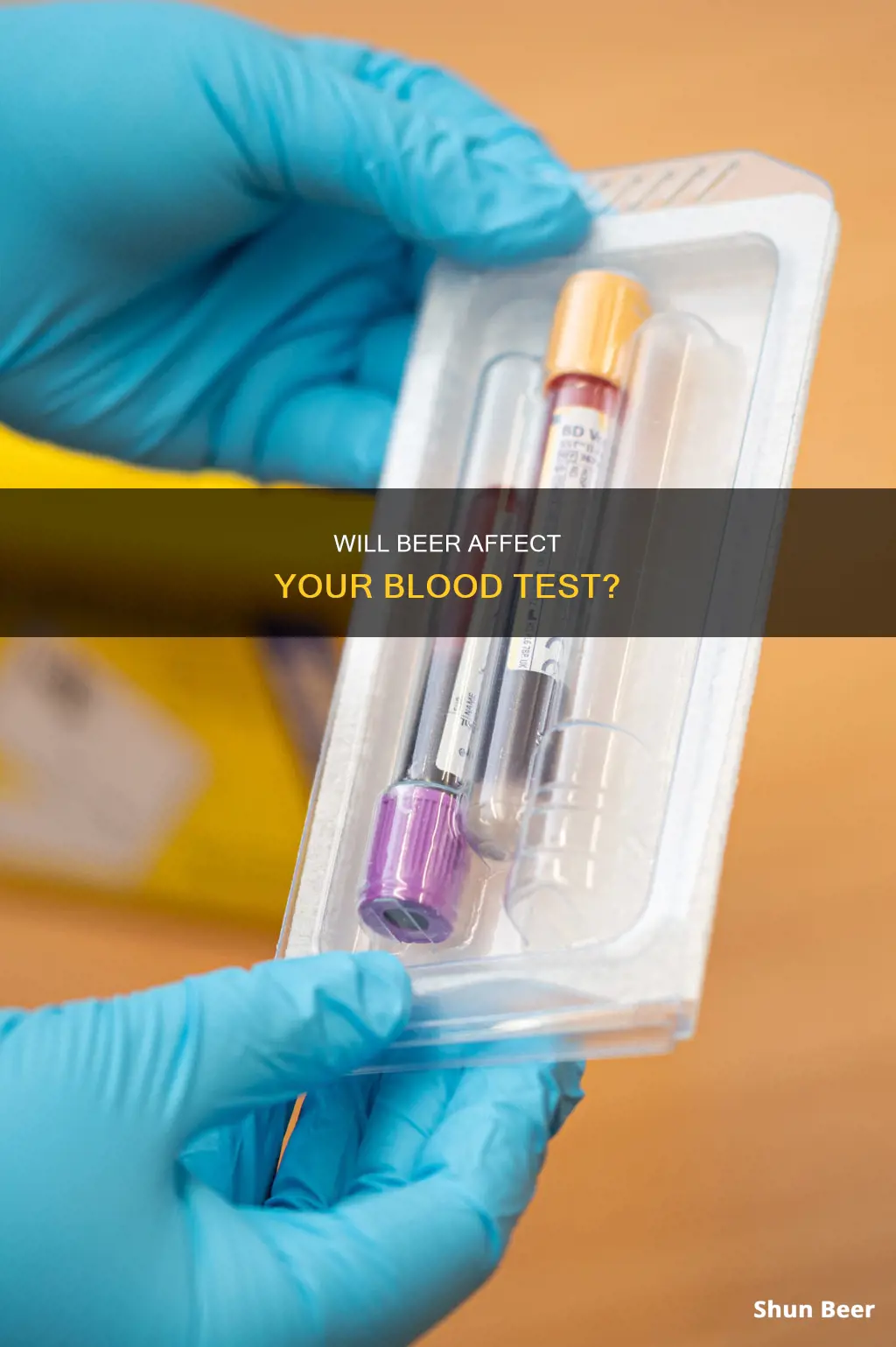
Drinking alcohol before a blood test is generally not recommended as it can affect the accuracy of the results. Alcohol can stay in the bloodstream for up to 12 hours and may cause temporary irregularities that can lead to inaccurate readings. It is best to abstain from alcohol for at least 24 hours before a blood test, especially if it is a fasting blood test. If you have consumed a small amount of alcohol within the past 24 hours, it is important to inform your healthcare provider to determine the best course of action.
| Characteristics | Values |
|---|---|
| Alcohol's impact on blood tests | Alcohol can affect the accuracy of certain blood tests by influencing the levels of certain substances in the blood. |
| Alcohol's impact on the body | Alcohol can disrupt the balance of glucose regulation, impair the liver's ability to produce glucose, alter enzyme activity, and affect fat metabolism in the liver. |
| Recommendations for alcohol consumption before a blood test | It is generally recommended to abstain from alcohol for at least 24 hours before a blood test, especially for fasting blood tests. |
| Detection of alcohol in the blood | A standard blood test can detect alcohol up to 12 hours after consumption, while the body may take up to 25 hours to fully metabolize and clear a moderate amount of alcohol. |
| Blood tests affected by alcohol consumption | Lipid panel blood test, liver function tests, blood sugar tests, coagulation tests, electrolyte tests. |
What You'll Learn
- Blood tests can detect alcohol up to 12 hours after consumption
- Alcohol can affect the accuracy of certain blood tests
- It is recommended to avoid alcohol for at least 24 hours before a blood test
- Alcohol can affect glucose levels and liver enzyme levels, impacting blood test results
- Blood tests are a reliable method for detecting heavy alcohol consumption

Blood tests can detect alcohol up to 12 hours after consumption
Blood tests are a quick and effective way for doctors to check your health and see if certain treatments are working. While it may be tempting to have a drink or two the night before a blood test, it is generally not recommended. This is because alcohol can affect the accuracy of certain blood tests by interfering with the levels of certain substances in the blood.
Alcohol can affect glucose levels (a type of sugar) in the blood, impacting the results of a blood sugar test. It can also affect the levels of certain enzymes in the liver, which can impact the results of liver function tests. In addition, alcohol can alter the clotting ability of the blood, which can impact the results of a coagulation test. It is worth noting that alcohol can also affect the accuracy of certain blood tests by altering the pH balance of the blood, which can impact the results of an electrolyte test.
The length of time that alcohol remains in the system can vary, but generally, it takes up to 12 hours for alcohol to get out of the bloodstream. However, even tiny amounts can be traced in the bloodstream after several days of consumption. The blood alcohol concentration (BAC) is expected to start dropping at a rate of 0.015 per hour, meaning the alcohol in the body will get metabolized and eventually eliminated at a steady rate.
Blood tests that assess liver health or triglyceride levels may require abstaining from alcohol for 24 hours beforehand. Alcohol can affect enzyme, glucose, and lipid levels, leading to inaccurate results. Therefore, it is best to avoid drinking alcohol before a blood test to ensure accurate results.
In summary, blood tests can detect alcohol up to 12 hours after consumption, and it is recommended to refrain from drinking alcohol for at least 24 hours before a blood test. If you have any concerns or questions about alcohol consumption and its potential impact on blood test results, it is best to consult with a healthcare professional.
Beer: World's Savior, Ancient Beverage
You may want to see also

Alcohol can affect the accuracy of certain blood tests
Alcohol can stay in your bloodstream for up to 12 hours, and even longer in tiny amounts. It takes your body about 25 hours to fully metabolize and clear a moderate amount of alcohol from your system.
- Affect glucose levels in the blood, impacting blood sugar test results.
- Alter the levels of certain enzymes in the liver, which can affect the results of liver function tests.
- Interfere with the clotting ability of the blood, which can impact the results of a coagulation test.
- Change the pH balance of the blood, which can affect the results of an electrolyte test.
Therefore, it is generally recommended to avoid consuming alcohol for at least 24 hours before a blood test to ensure accurate results. If you have consumed a small amount of alcohol within the past 24 hours before your test, you should discuss this with your healthcare provider, who can advise you based on the specific test and the amount of alcohol consumed.
How Much Is Too Much? Drinking 12 oz Beer
You may want to see also

It is recommended to avoid alcohol for at least 24 hours before a blood test
If you have a blood test coming up, it's important to know that alcohol can affect the accuracy of your results. Alcohol can stay in your bloodstream for up to 12 hours, and even tiny amounts can be traced in the blood several days after consumption. The blood alcohol concentration (BAC) will start dropping at a rate of 0.015 per hour, but the time it takes to eliminate alcohol from your body depends on the amount consumed. The more drinks you've had, the longer you'll need to wait to get it out of your system.
Alcohol can interfere with the accuracy of specific blood tests by affecting the levels of certain substances in the blood. For example, alcohol can impact your blood sugar levels, enzyme levels in the liver, clotting ability of the blood, and the pH balance of the blood. These changes can affect the results of a fasting blood glucose test, liver function test, coagulation test, and electrolyte test.
To ensure the most accurate results, it is generally recommended to avoid alcohol for at least 24 hours before a blood test. This is especially important if you are required to fast before the test. Fasting means not eating or drinking anything except water for a specified period, usually 8-12 hours, before the test. Alcohol can disrupt the fasting state and impact the accuracy of the test results.
If you have consumed a small amount of alcohol within the 24 hours before your blood test, it is best to discuss this with your healthcare provider. They can advise you on the best course of action based on the specific test and the amount of alcohol consumed. It is also important to be honest with your healthcare provider about your alcohol consumption, especially if you are a heavy drinker. They may recommend abstaining from alcohol for a certain period before the test to ensure accurate results.
Morphine and Beer: A Dangerous Mix?
You may want to see also

Alcohol can affect glucose levels and liver enzyme levels, impacting blood test results
Drinking alcohol can affect the accuracy of certain blood tests by interfering with the levels of certain substances in the blood. Alcohol can affect glucose levels and the levels of certain liver enzymes, which can impact the results of liver function tests.
When alcohol is consumed, it can disrupt the balance of glucose regulation in the body, as it impairs the liver's ability to produce glucose and may lead to hypoglycemia. This can affect the results of a blood sugar test. Additionally, alcohol can alter enzyme activity and fat metabolism in the liver, which can affect various blood test components and lead to inaccurate readings, especially in tests that rely on liver function markers and lipid levels.
It is recommended to abstain from alcohol consumption before getting blood work done, especially for a fasting blood test. A standard blood test can detect alcohol up to 12 hours after consumption, but it may take up to 25 hours for the body to fully metabolize and clear a moderate amount of alcohol from the system. Therefore, it is generally advised to refrain from consuming alcohol for at least 24 hours before a blood test to ensure the most accurate results.
If you are concerned about the impact of alcohol consumption on your blood test results, it is best to consult with your healthcare provider. They can provide personalized guidance based on the specific test and the amount of alcohol consumed.
Beer Station on Carnival Fantasy: How Does It Work?
You may want to see also

Blood tests are a reliable method for detecting heavy alcohol consumption
Blood tests can measure blood alcohol content (BAC) and detect heavy alcohol consumption within a 6- to 12-hour window after the last drink. Direct biomarkers in blood tests, which exclusively stem from alcohol consumption, are considered more accurate, with an accuracy rate of 99%. These tests can also be used to detect alcohol relapse or reduction.
However, it is important to note that alcohol can interfere with the accuracy of specific blood tests by affecting the levels of certain substances in the blood. For example, alcohol can impact glucose levels, enzyme levels in the liver, and the clotting ability of the blood. Therefore, it is generally recommended to abstain from alcohol for at least 24 hours before a blood test to ensure the most accurate results.
If you are concerned about the impact of alcohol on your blood test results, it is best to consult with your healthcare provider, especially if you are a heavy drinker. They can provide guidance based on the specific test and your alcohol consumption patterns.
Beer Macros: Why They Fail and How to Fix It
You may want to see also
Frequently asked questions
It is not recommended to drink beer 12 hours before a blood test as alcohol can remain in the bloodstream for up to 12 hours and even longer in trace amounts. It is best to abstain from alcohol for at least 24 hours before a blood test to ensure accurate results.
Drinking alcohol before a blood test can cause inaccurate results as it can affect the levels of certain substances in the blood, such as glucose and fat levels. Alcohol can also interfere with coagulation tests by affecting the clotting ability of the blood.
Yes, blood tests that assess liver health or triglyceride levels typically require abstinence from alcohol for 24 hours beforehand. Fasting blood tests, such as a fasting blood glucose test or a liver function test, also require abstinence from alcohol.







